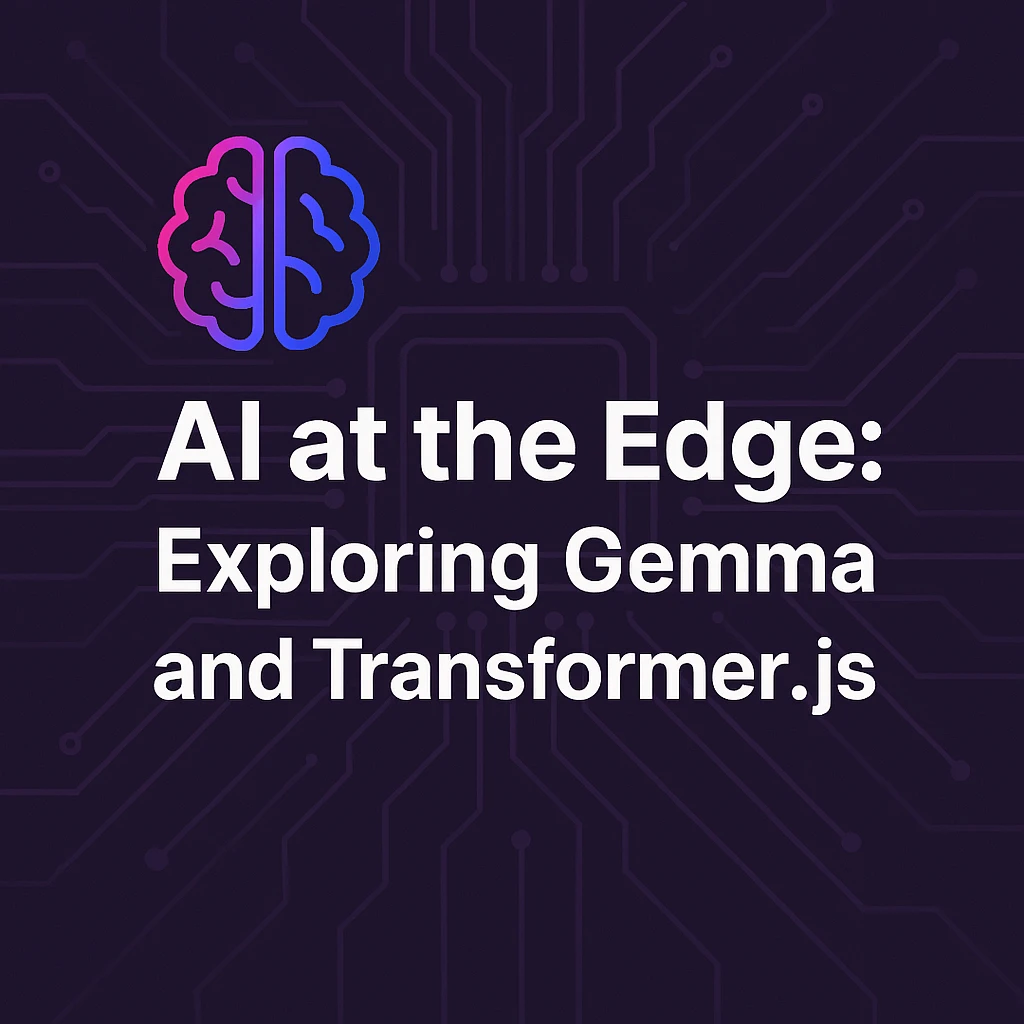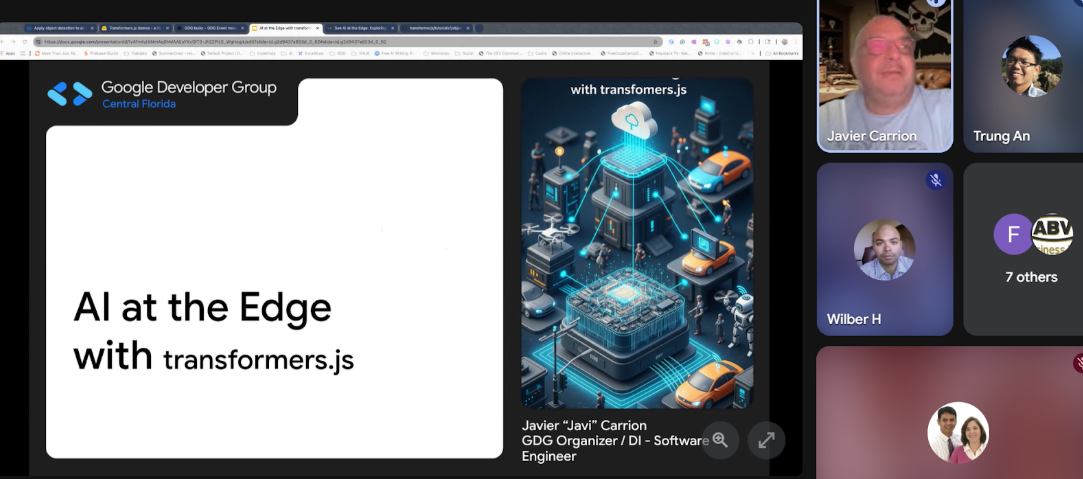AI at the Edge: Exploring Gemma and Transformer.js

AI at the Edge: Exploring Gemma and Transformer.js
A huge thank you to the incredible community that came out to our Google Developer Group Meetup yesterday! The meetup was buzzing with excitement as we explored the most exciting movements in technology today: AI at the Edge.
For anyone who missed it, or for those who want to revisit the key ideas, here’s a summary of the major themes we explored.
The Big Idea: Bringing AI Home
The core theme of our meetup was the shift from cloud-centric AI to on-device processing. We discussed how running AI models directly on user devices—like laptops, phones, and IoT gadgets—is revolutionizing the way we build applications in strategic use casese. This approach offers huge benefits in speed, privacy, cost-efficiency, and the ability to work offline.
Key Technologies We Explored
We focused on a few powerful tools and frameworks that are making edge AI more accessible than ever:
-
Running Local LLMs with Ollama & Semantic Kernel: We kicked things off by exploring how to run powerful, open-source large language models (like Llama 3, Mistral, Gemma) right on your own machine using Ollama. This unlocks incredible potential for private, fast, and cost-free AI experimentation. We then connected this to Microsoft’s Semantic Kernel, an SDK that acts as an “orchestrator” for your AI, allowing you to chain models, skills, and functions together to build sophisticated agents and applications.
-
AI in the Browser with Transformer.js: For our web developer community, the session on Transformer.js was a game-changer. We saw how this brilliant library allows you to run state-of-the-art Hugging Face Transformers models directly in the browser. This empowers JavaScript developers to integrate incredible machine learning capabilities—like sentiment analysis, text generation, or even image classification—into any web application, with no server-side backend required!
Community Spotlight: Eddie’s “CAPTCHA Grind” Project
It’s one thing to talk about technology, and another to see it in action. A special thank you goes to Eddie for sharing his fascinating project, CAPTCHA Grind. We love to give our members an opportunity to share and inspire other members. Loved to see Eddie’s full-stack game in action. Thanks for the inspiration, Eddie!
Special thank you to Javier for leading our workshop on Transformer.js. Talking to folks after the meetup, people showed great engagement on this novel capability.

Your Journey Continues
We hope you left the meetup inspired and armed with new ideas for your own projects.
To help you on your development journey, we’ve collected the resources and links from our session below.
DevFest GemJam - Oct 25
DevFest GemJam is a welcoming space where people of all backgrounds come together to imagine, build, and share ideas for a better future. Instead of focusing on competition or speed, we emphasize collaboration, creativity, and community impact. With AI transforming the world, we approach it as a tool for augmentation, not replacement — a partner that supports human creativity, connection, and problem-solving.
At this event, participants explore how to use AI responsibly and ethically, ensuring that innovation is guided by inclusivity, fairness, and care for people. Whether you’re a coder, designer, storyteller, or community builder, there’s a place for your voice. Together, we’ll create solutions that reflect both human ingenuity and human values.
Call for speakers
We really love to engage our community to share their knowledge, passion, and projects with our GDG. If you’re interested in speaking with GDGCF, please consider applying through our “call for speakers” form.
Show Notes & Resources
Transformers.js Documentation
Transformers.js is a JavaScript library that allows you to run transformer models in the browser. It provides a simple and efficient way to leverage the power of these models for various NLP tasks. The library supports a wide range of models, making it a versatile tool for developers. With Transformers.js, you can easily integrate advanced NLP capabilities into your web applications.
Object Detection Tutorial
This tutorial demonstrates object detection using TransformerJS. It guides you through the process of building and implementing an object detection model. The tutorial is likely to cover concepts like data preparation, model training, and evaluation. Specific details regarding the dataset and model architecture used would be found within the tutorial itself.
Transformers.js Demos
This collection showcases various demos built using Transformers.js, a library for running transformer models in the browser. The demos highlight the capabilities of Transformers.js, allowing users to interact with and experience the power of these models directly within their web browsers. These interactive examples are designed to be educational and demonstrate practical applications of transformer models. Explore diverse applications ranging from text generation and classification to question answering and more.
Quickstart: Build a semantic application with Semantic Kernel - Semantic Kernel
This guide demonstrates how to build a simple semantic application using Semantic Kernel and Python. You will learn to set up your environment, integrate with OpenAI, and create a function to answer questions based on your provided text. The process involves installing necessary packages, configuring API keys, and writing concise code to connect the components. This quickstart provides a foundational understanding for developing more complex semantic applications.
ollama
Explore the power LLMs offline.
llm-power-tools
This repository contains a collection of tools for working with large language models (LLMs). The tools are designed to be easy to use and to help you get the most out of your LLMs. The tools are written in Python and are available under the MIT license. This project aims to provide helpful utilities and resources for developers in the LLM space.
Building the CAPTCHA Grind App
This article details the process of building a full-stack application called CAPTCHA Grind. The app focuses on solving CAPTCHAs, offering a platform to earn money by completing these tasks. The development involved various technologies and frameworks, including React, Node.js, and MongoDB. The author shares insights into the challenges and solutions encountered during the project, providing a valuable learning experience for aspiring full-stack engineers.
n8n - Free and open-source workflow automation tool
n8n is a free and open-source workflow automation tool that allows you to connect different apps and services. It’s highly flexible and customizable, enabling you to automate various tasks and processes. Users can build workflows visually using a simple drag-and-drop interface, without needing extensive coding knowledge. n8n is a powerful tool for businesses of all sizes looking to streamline their operations.
Deno - A secure runtime for JavaScript and TypeScript
Deno is a simple, modern, and secure runtime for JavaScript and TypeScript that is built on V8, the same JavaScript engine used by Chrome. It offers built-in support for TypeScript, enabling developers to write more robust and maintainable code. Deno emphasizes security by default, requiring explicit permissions for network access and file system operations. It’s designed to be a more secure and efficient alternative to Node.js, with a focus on modern web standards and developer experience.
Thanks again for making this such a great event. We can’t wait to see what you build.
Hope you have a great one, and see you at the next meetup!